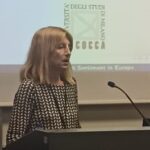Every year, an International Week is organised for our students. It is our pleasure to welcome teachers from different foreign universities who will present material on various topics linked with Data Science studies in English throughout the week!
Save the Date !
15 January – 17 January 2024
The invited speakers for the 2024 edition are :
Learn more about them...
- Ota Novotný
- Kristýna Vltavská
- Filip Vencovsky
- Zdeněk Vondra
- Petr Mazouch
- Tomasz Czapran
- Catriona Maclean
- Julie Dugdale
- Alessandra Michelangeli
 Prof. Ota Novotný from University of Economics in Prague. Prof. Ota Novotny is in charge of « Business Intelligence ».
Prof. Ota Novotný from University of Economics in Prague. Prof. Ota Novotny is in charge of « Business Intelligence ».
 Prof. Kristýna Vltavská from Prague University of Economics and Business. Prof. Kristýna Vltavská is in charge of Statistics practical with Prof. Petr Mazouch.
Prof. Kristýna Vltavská from Prague University of Economics and Business. Prof. Kristýna Vltavská is in charge of Statistics practical with Prof. Petr Mazouch.
Dr Filip Vencovsky works as an Assistant Professor of Informatics at the University of Economics in Prague. In 2018, he defended his PhD on the subject of text mining customers’ feedback from online reviews. He teaches software engineering, business analysis and analysis of unstructured data.
 Prof. Zdeněk Vondra from University of Economics in Prague.
Prof. Zdeněk Vondra from University of Economics in Prague.
 Prof. Petr Mazouch from Prague University of Economics and Business. He is in charge of Statistics practical with Prof. Kristýna Vltavská.
Prof. Petr Mazouch from Prague University of Economics and Business. He is in charge of Statistics practical with Prof. Kristýna Vltavská.

Doctor of Economics in the field of Management Science (University of Economics in Prague, the Czech Republic). A specialist in management, sales psychology, communication, and business negotiations.
Manager with 15 years of experience in sales and strategic management. His working experience has been gained in five different countries: Germany, the Czech Republic, the UK, Türkiye and in Poland while working for Oracle Corporation, Cisco Systems, Inc., Bayerische Motoren Werke AG, GeoVision Inc., Oras Group and SGS GmbH, among others.
Business & CRM trainer conducting training courses in English, Polish and Czech languages in cooperation with British company Templeton & Partners Ltd., mainly in the field of Microsoft Dynamics & Salesforce in the region of Central and Eastern Europe (CEE), but also sales workshops as well as motivational and product training courses.
 Quick Bio : Catriona Maclean is a junior lecturer in complex algebraic geometry in the UGA, and has been living in Grenoble for 16 years, after studying in Cambridge and Paris.
Quick Bio : Catriona Maclean is a junior lecturer in complex algebraic geometry in the UGA, and has been living in Grenoble for 16 years, after studying in Cambridge and Paris.
Her talk will consist in a whistle stop tour of the many ways statistics can be used to lie to you, and how to notice when it happens.

Julie Dugdale is a Professor at University Grenoble Alps, teaching undergraduate students on BUT Computing course at IUT2. From 2010 to 2020, she was the head of the HAwAI (Human Aware Artificial Intelligence) Research Team at the Grenoble Informatics Laboratory (LIG). She is now part of the STEAMER research team at LIG, which concerns Information Systems, focusing on the spatial and temporal dimensions of data. Her research concerns modelling and simulating human behaviour using an agent-based approach.

Alessandra Michelangeli, M.Sc. and PhD in Economics (Bocconi University & Cergy-Pontoise University) is Associate Professor of Economics at Milan-Bicocca University. Her research mainly focuses on Public Economics; Multidimensional Well-being & Inequality. She published several academic articles in international economic journals including: Journal of Economic Theory, Applied Economics, Journal of Economic Inequality, Urban Studies, Regional Studies, Cambridge Journal of Regions, Economy and Society,. She is editor of a book on urban quality of life published by Routledge, and co-author of a book on quality of life in Italian cities published by Bocconi University Press.
The following topics will be addressed this year :
- BI: From raw data to business presentation
- Economic Statistics, Statistics Practical
- Introduction to Microsoft Dynamics 365
- Text Mining
- AI, what it is and how does it work
- A comparison of left behind places and more developed regions in EU
Economic information is important for controlling, making decisions, preparing future business plans or rating organization status. There are many ways how to get economic information form raw business data – e.g. with using business intelligence methods. When the information is discovered and delivered, another challenge is to set up the company strategy, execute and present it in the manner consistent with presentations, audience and situation.
We will provide a hands-on workshop, which will guide students from analysis of raw business data, through decision among available business scenarios to elaboration of business presentation.
Students will learn how to analyze raw business data with business intelligence methods. Then they will learn scenario elaboration, execution and evaluation, which tools and media types to use in different situations. Students will work in groups (4-5 members). These groups will compete with each other to provide the best output.
- First-year students
The course introduces the methodology and the estimations of the main statistical indicators (namely un/employment, and gross domestic product) from the point of view of economic statistics. Students learn about the adequation gap and they are able to solve the adequation gap for the main economic indicators. The up-to-date statistics and international comparison using the main economic indicators is part of the course as well.
- Second-year students
The course focuses on the data quality and the code of practise which is used in the European statistics. Moreover, this course introduces composite indicators that are widely used for the ranking of the countries not just in the economy. The ranking seems thorough and easy to interpret. However, many doubts have arisen in relation to the compilation of the composite indicator. This lecture aims to show the step-by-step procedure of compiling a composite indicator, i.e. choosing relevant variables, methods of standardisation, the weighting scheme, data aggregation, the sensitivity test, etc. This lecture points out the weaknesses and strengths of composite indicators and demonstrates how users should read them. Students prepare their own composite indicator towards the end of the lecture using MS Excel that determines the best country in terms of living. The subsequent alterations in their indicator show students how results may be manipulated by merely changing the weighting scheme or the aggregation method. Such work equips students with better skills for the interpretation of composite indicators for the future.
Throughout this workshop, Data Science students will gain an understanding of customer relationship management (CRM) through the lens of Microsoft Dynamics 365 Sales & Marketing.
In this course, the workshop participants will learn to navigate the Microsoft Dynamics platform confidently, exploring its user-friendly interface and understanding how to access and utilize key features. From lead generation to deal closure, the trainer will navigate the intricacies of managing customer interactions, optimizing sales pipelines, and leveraging data insights to drive business success.
Above all, students will learn the power of analytics and reporting tools within Microsoft Dynamics 365.
No programming experience is required for this workshop.
Textual data, such as documents, websites, and conversations, makes a significant part of all data available. Textual data brings great potential for business purposes. On the other hand, harnessing such data requires an understanding of limitations and possibilities of text processing.
This course provides a brief overview of the possibilities and limitations that come with an analysis of textual data. The students will understand the most common business cases based on the analysis of textual data and will experience practical analysis of sentiment.
The course begins by looking at the history of AI. We examine the huge breakthroughs that we have seen in recent years, together with the things that have stopped AIs advance in the past. The course looks at how AI makes decisions, how AI can search for solutions, and how AI can learn its way to a solution using machine learning. Although the power of AI has solved many problems, it has opened up many ethical challenges, which will be investigated during the course. Looking towards the future we examine the notions of artificial general intelligence and superintelligence. The course is accompanied by practical lab exercises, during which we will explore the topic covered during the course.
Contents of the course
GDP and Beyond GDP approach. Measures of income inequality; poverty; multidimensional wellbeing.
Empirical applications to European Union countries using official statistics (EUROSTAT, OECD) and European Surveys (European Social Survey, Eurobarometer).
Seminar about territorial disparities in EU countries.

 Dr Filip Vencovsky
Dr Filip Vencovsky
